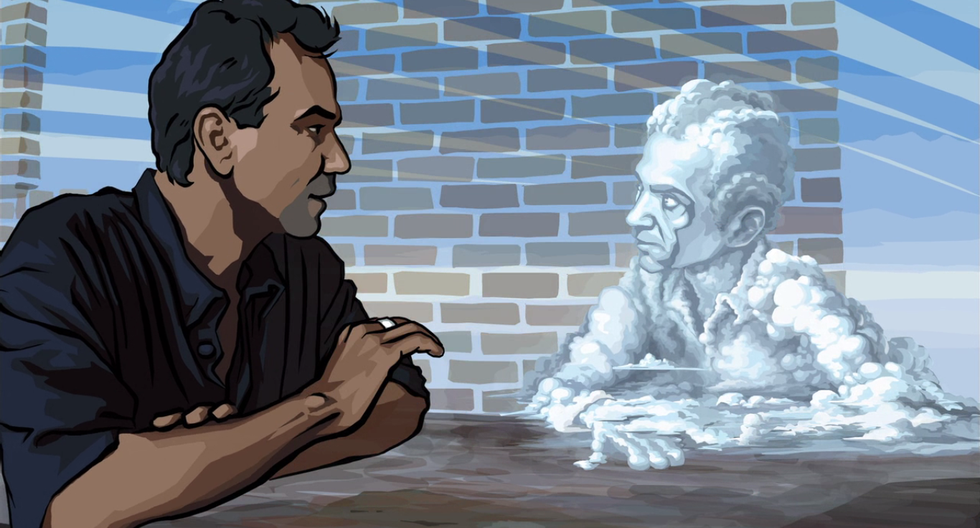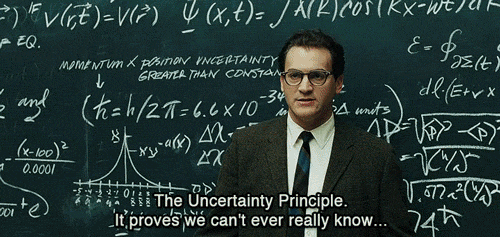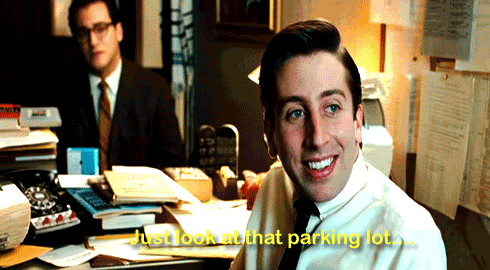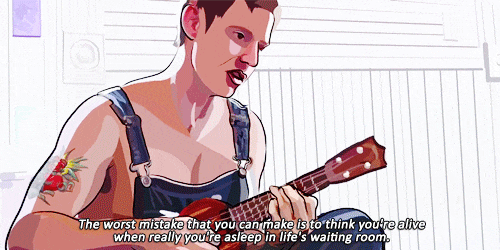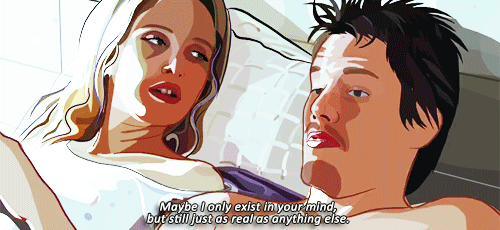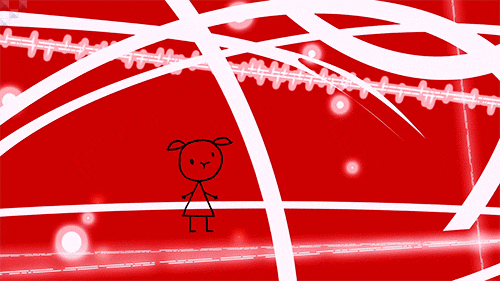If you’ve ever taken a philosophy class, chances are your teacher has probably tried to illustrate their point by showing a film. Let me guess, they put in The Matrix to talk about skepticism, or they put in Minority Report to relate to free will. Well, here we have a list for those who have eager, ever-expanding minds that would like the films they watch to challenge their ideas about life, and are tired of seeing The Truman Show, Blade Runner, and Memento perched at the top of every list of philosophical films. Maybe you’ve seen these films, maybe you haven’t, but it’s the latter that I’m concerned with, for if you have an inquisitive mind in that head of yours, you may want to pop in these films and digest. For those who have seen them, they’re always due for another viewing.
1. A Serious Man (2009)
Our first entry to this list is a personal favorite and a film that had been off my radar for years. In fact, when I bring up this Best Picture Nominee to my peers, I find that a startling majority of them have never heard of it. Many of them are even self-proclaimed Coen Brother aficionados.
In a year surrounded by films like Inglorious Basterds, Avatar, District 9, and The Blind Side it’s easy to see why this modern day bible story, with it’s lack of CGI, Blood, and Sandra Bullock, was left on the curb. It, nonetheless, is a fantastic piece of filmmaking by two of the finest auteurs of the last 50 years. It also is a poignant retelling of one of the most popular tales in the Hebrew Bible and the Old Testament, the Book of Job.
The story takes place in the 1960’s and centers on a college physics professor named Larry Gopnik. Now Larry, “didn’t do anything”, as he likes to point out throughout the film, and yet he is faced with test after test of his own faith in God. His wife asks for a divorce and reveals she’s been sleeping with the silver-tongued Sy Ableman who insists he move out and sleep at a motel, one of his students tries to bribe him for a better grade, he gets into a car accident, Sy Ableman dies and Larry is forced to pay for his wife’s lovers funeral, his kids are reckless and care only about rock music and blow-drying their hair, his handicapped brother is arrested for gambling, and those are just a few of the obstacles thrown in Larry’s way over the course of the film.
Now, Larry is Jewish, he’s always been a very good Jew but perhaps he hadn’t given much thought to God and so God felt the need to remind him that he’s still up there. However, rather than send Larry a miracle, which may have gotten his point across, the film would like to explore the God’s injustice and seemingly lack of response to human suffering. As a physics professor, who just happens to be teaching about the uncertainty principle, Larry should know all about chaos and the notion that anything can happen at any time.
If Larry had the chance to speak to God, he would no doubt ask him why he lets his people suffer. Is it a test of faith or is he just a cruel God who gets off on seeing people pray to him? Do these tests help strengthen a person’s faith in the almighty or just succeed in diminishing what little faith they may have had left? The Ingmar Bergman classic The Seventh Seal also touches upon this subject but if you’re reading this article you probably already knew that.
I could go on and on about this film, as I mentioned it is a favorite of mine. Human suffering and the problem of evil with respect to God are two subjects not focused on too much in modern filmmaking. I think the Coen’s have certainly made something special and have some wise words to say in response to the question “what’s the point of it all?” They’d just sip on their tea like Rabbi Nachtner and say, “we can’t know everything.”
Quotes from the film:
“Why does he make us feel the questions if he's not gonna give us any answers?”
“The boss isn't always right, but he's always the boss.”
“The Uncertainty Principle. It proves we can't ever really know... what's going on. So it shouldn't bother you. Not being able to figure anything out. Although you will be responsible for this on the mid-term.”
“I haven't done anything.”
2. Waking Life (2001)
Have you ever asked questions involving, free will, existentialism, death, skepticism, identity, dreams, alienation, reincarnation, or society and wished there was a film that had all of those questions packed into it? Well you’re in luck!
If you want a philosophical action flick that takes place in the dream world, then go ahead and watch Christopher Nolan’s 2010 film Inception. But if you want a mosaic, anthological, weirdly-animated, movie that features a bunch of smart dream people waxing philosophical for an hour and 39 minutes (I sure do!) then Richard Linklater’s 2001 film Waking Life is the film for you.
The film follows one character (simply named Main Character) as he wanders around his dream meeting different people and getting certain answers without even asking the questions. Is he asleep? Is he dead? The movie is unclear about that but what lies in between the first and last words uttered is some of most profound and tightly packed philosophy spoken in film that isn’t a documentary.
Some of the characters he meets are scholars and are very clear with what they are saying and others just random passerby’s who spout out single phrases like, “as the pattern gets more intricate and subtle, being swept along is no longer enough.” If you were blown away by that quotation, then hold on to your hats because this film is chalk full of potentially life changing and eye opening passages what will certainly invoke discussion among those you watch it with.
Some become off-put by the style of animation (called rotoscoping) because it is not clean and it moves around even when the camera and characters are still. We feel like we’re watching abstract paintings in motion. This technique only adds to the feeling of being lost in a dream world, it is disjointed but coherent but you come out of it with a seemingly less understanding of the world around you. The films act’s less as a source for the answers and more as an invitation to the questions. I recommend this film to anyone who is interested in getting started with studying philosophy. As one Redditor described the film, “It’s a sampler platter for people who haven’t been to the philosophy restaurant yet.”
Quotes from the film:
“They say dreaming is dead, no one does it anymore. It's not dead it's just that it's been forgotten, removed from our language.”
“Existentialism is often discussed as if it's a philosophy of despair, but I think the truth is just the opposite. Sartre, once interviewed, said he never really felt a day of despair in his life.”
“The worst mistake that you can make is to think you're alive when really you're asleep in life's waiting room.”
“The idea is to remain in a state of constant departure while always arriving.”
“What you do makes a difference. We should never simply write ourselves off and see ourselves as the victim of various forces. It's always our decision who we are.”
3. World of Tomorrow (2015)
If you’re sitting at home, perusing the internet, watching cat videos on YouTube and you have 17 minutes to spare, I want you to do yourself a favor and find a way to watch Don Hertzfeldt’s 2015 short film World of Tomorrow.
If you’re familiar with Don Hertzfeldt’s past work (Rejected, It’s Such a Beautiful Day) then you’ll know that the man has quite an imagination in that head of his. World of Tomorrow may just be his smartest, most accessible, and beautiful film to date.
The story centers around a little girl, roughly 3 or 4 years old, named Emily, or Emily Prime, who, one day, receives a message from a future clone of herself 200 years in the future. Clone Emily, Emily 3G, zaps Emily Prime into the future where she shows her what life is like as the world is about to end. After so many generations of cloning, Emily 3G has become almost emotionless standing next to her childish, bubbly, original self. The two travel around the universe where Emily 3G tells Emily Prime of her adventures, her past loves, and her sorrows.
The mundane stories, mixed with Emily’s deadpan delivery depict a future in which robots fear death, people fall in love with rocks, a human life becomes a museum exhibit, people’s memories are of themselves watching a screen of themselves watching a screen of themselves watching a screen ad infinitum, people preserve the dead by stretching their faces over flailing robots, and consciousness’s can be uploaded into floating black boxes.
Might I remind you, all of this is packed into one short, 17-minute animated film. Never have I experience such an array of emotions in such a short amount of time just by watching stick figures. I’ve seen the film over and over to try to decipher it and pick up on all the philosophical questions and what the film is trying to say.
It’s focus ranges from subject to subject but the common theme across the board appears to be death and memory. Emily 3G lives in a world in which memories are so cherished and the preservation of the past is so important that the clones find themselves in search of what it means to be human through the memories of their original selves. The end is very near and yet, rather than be afraid, rather than panic as their loss of life becomes more imminent, the one thing that Emily 3G wants most is a memory of Emily Prime walking with her mother that was lost in the cloning process. A great moment comes and displays Emily 3G’s humanity when she describes what she felt after the death of her husband. She says that she did not have the “capacity” to deal with the loss and sometimes she sits in a chair at night and quietly feels very bad. She goes on to say, “I am very proud of my sadness because it means I am more alive.”
While the film is heavy, I assure you it is equally adorable. I find myself with a giant grin at times and welling with tears at others. That is the affect that this short film has and why it deserves to be on this list. Don Hertzfeldt achieves in 17 minutes what most filmmakers try, and mostly fail, to achieve in two hours and I urge you all to give it a chance.
Quotes from the film:
“That is the thing about the present, Emily Prime. You only appreciate it when it is the past.”
“This is your future, Emily Prime. It is sometimes a sad life, and it is a long life. You will feel a deep longing for something you cannot quite remember. It will be a beautiful visit, and then we shall share the same fate as the rest of the human race: dying horribly.”
“Do not lose time on daily trivialities. Do not dwell on petty detail. For all of these things melt away and drift apart within the obscure traffic of time. Live well and live broadly. You are alive and living now. Now is the envy of all of the dead.”



